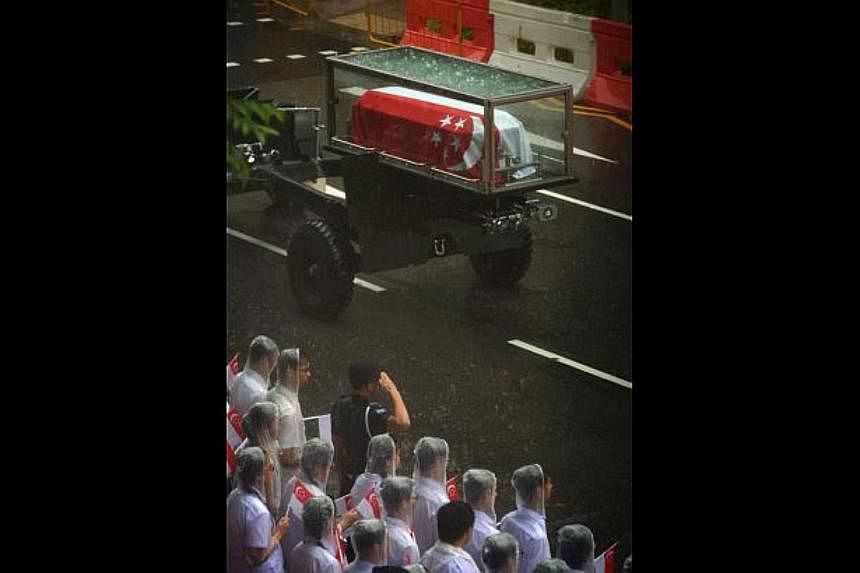Soon after The Singapore Story, the first of the two-part memoirs of Mr Lee Kuan Yew, was published in 1998, a copy landed on my desk in the Straits Times newsroom.
I had not expected it. It was from Mr Lee, and was signed by him. He penned a simple message that seemed characteristic of him: "To Warren Fernandez, With my thanks for the attention to detail and to the broad shape of the book to make it reading friendly."
It was a kind reward for our efforts. I was one of several journalists roped in to assist him with the editing of his manuscript. This followed on from an earlier book on him that my colleagues and I had written, titled Lee Kuan Yew: The Man And His Ideas.
Admittedly, as a young journalist then barely out of my 20s, being asked to critique the work of the country's founding father seemed a daunting task. So, when the opportunity arose, I asked him with some trepidation exactly what he was expecting us to do, and why he was taking such great pains with his book.
He answered matter-of-factly: "I want it to be read. No use if I write it and people don't read it. I want them to read it, especially the young, and understand how we got here."
This recollection came to me last Sunday when Prime Minister Lee Hsien Loong recounted how Mr Lee had been relentless in his efforts to secure Singapore's future, including writing book after book in his final years.
"His biggest worry was that younger Singaporeans would lose the instinct for what made Singapore tick. This was why he continued writing books into his 90s," said PM Lee in his eulogy to his father at the University Cultural Centre.
"Why did he do this? So that a new generation of Singaporeans could learn from his experience, and understand what their security, prosperity, and future depended on."
Indeed, Mr Lee seemed determined to give his memoirs his best shot. He was assiduous in seeking out and responding to our critiques. Initially, I had wondered if he would really be open to our suggestions. But I soon discovered that each time we sent him our views, a revised version would come back in a flash.
"Is this better? Does it work now?" he would ask.
We replied: Could we have more details? More personal anecdotes? More context to help explain the point being made, and guide the reader along?
Again the revisions would come, with a similar response: "Does this work?"
Back and forth it went, version after version, so many that we sometimes found it hard to keep track of all of them. Mr Lee never seemed to tire of the process. And so over time, the caricature of the man as a fearsome leader, who brooked no dissent and was impervious to others' opinions, became less and less real to me.
So, you might ask, just what was Mr Lee so worried about that he felt a need to put all these thoughts to paper? Was it a concern that younger Singaporeans might not support his ruling People's Action Party as strongly as their parents had?
Obviously as a political leader, he must have wanted his party to continue to win support, but his concerns seemed to go much further. I came to this conclusion gradually as I pondered his responses to questions we posed him on various occasions. He would say often that his primary concern was not just the support for, or survival of, the PAP, but for whoever could deliver good government in the interests of the people of Singapore.
"Do people have good jobs? Do they get the education to prepare for those jobs? Can they afford to buy their own home? How will they defend those homes? How will they provide for their children? These are the issues that cut to the bone," I recall him saying, in words to that effect.
Beyond these were even deeper issues which he seemed especially concerned that younger Singaporeans grasped - not just intellectually but also instinctively - namely, just how unlikely a nation Singapore is, how deep the emotive pulls of race and religion can be, or how these latent forces can be so easily roused and whipped into a frenzy for political effect.
And how vulnerable a little red dot like Singapore was, and remains - even though, or perhaps especially as, it has prospered over the years - in a world where the positions of seemingly friendly countries could ebb and flow, and change without much warning.
So, as I watched last Sunday's solemn ceremonies to send Mr Lee to his rest, I could not help but wonder what he would have made of all that unexpected outpouring of grief.
To what effect, he might have asked, or just how does this help Singapore?
Clearly, many Singaporeans were deeply saddened by Mr Lee's passing. Many of us had hoped that he would hold out until August at least, to join in the 50th anniversary celebrations, especially the parade at the Padang, where he had made so many momentous proclamations. Indeed, it would have been fitting for him to be there. You can just imagine the cheers and applause that would have greeted him, judging by the response he received at past parades.
Perhaps that might have pleased Mr Lee. Yet, I can't help but suspect that he would have wanted more than just some fleeting feel-good moment on Aug 9.
Rather, he might have been more heartened by how his passing served to galvanise the country, including the young, into remembering some of the ideals he stood for, the no-holds-barred battles he fought, the tough-minded decisions he took, and yes, also the fallout that some of these entailed.
In a way, the events of the emotional week of mourning did more to focus minds on the real significance of SG50 than anything else so far. That was Mr Lee's parting gift to Singapore. Since he could not rise from his grave to fix problems he spotted, as he once proclaimed he would, he at least managed in death to rally his people around, just one last time, as he had so often done in life.
These sombre thoughts were running through my mind as the National Anthem sounded, and I watched on television the crowd in the hall, and outside, singing Majulah Singapura and reciting the Singapore Pledge.
How many of us know what it all means, or even how the anthem and pledge had come about, I wondered. I confess I had to look it up to be sure. I was reminded for my pains that the anthem many call the Mari Kita was actually composed in 1958 as a song for use by the City Council at public events. A shortened version was later adopted as a state anthem when Singapore gained self-government in 1959, and later became the National Anthem of our independent Republic in 1965.
It had deliberately been written in simple Malay to make it easy to remember, and expressed well the yearning for a "new spirit" of unity, amid the bitter divisions of race and religion in this disparate society. This would ultimately give rise to a new state founded on the principles of racial equality and meritocracy.
Go ahead, play the tune in your mind: Mari kita (come let us all), rakyat Singapura (people of Singapore) sama-sama menuju (proceed together towards) bahagia (happiness); cita-cita kita yang mulia (may our noble aspirations bring) berjaya Singapura (Singapore success). Marilah kita bersatu (come let us all unite), dengan semangat yang baru (in a new spirit), semua kita berseru (as together we proclaim), Majulah Singapura (Onwards Singapore), Majulah Singapura.
The same goes for the pledge, as MPs recalled recently how Mr Lee had once rushed to the House to speak after he read a newspaper report which led him to feel he had to make clear to all that the lofty ideals expressed in the pledge were noble aspirations to be strived for, but which would not be made reality simply by repeated assertion.
That, I figure, is what Mr Lee worried about. He wanted us to not just know the words and mouth them, or buy his books and not reflect on them. He wanted us to realise just how much work it would take to live up to the ideals, safeguard what had been built, and secure our future.
For unless we did, the words and books, the anthem and pledge, the battles fought and won, the global metropolis built from mudflats, would simply not endure. And that, as Mr Lee was wont to say, would be that.
Follow Warren Fernandez on Twitter @theSTeditor


